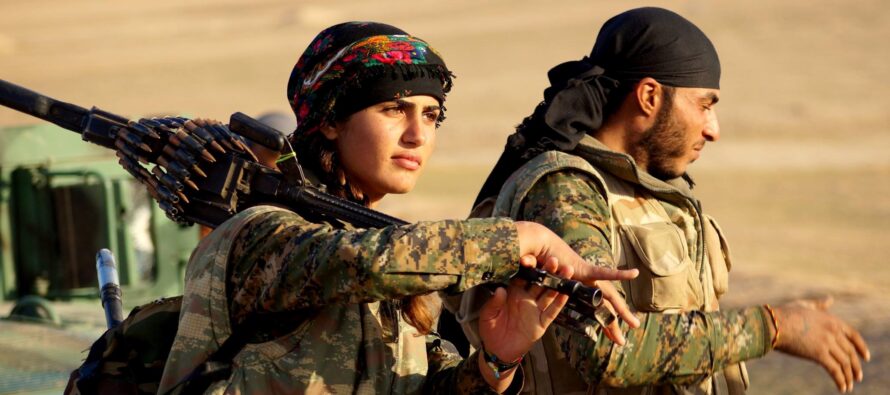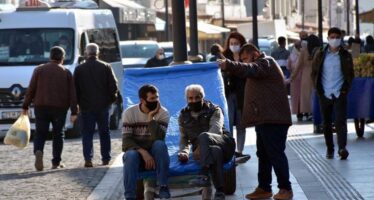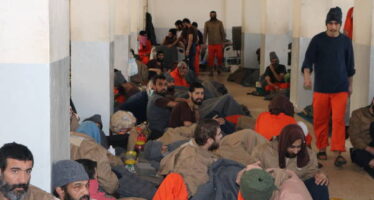“NO MORE WEAPONS” for Kurds: Erdoğan says Trump agrees…

![]()
“…Will be speaking to President Recep Tayyip Erdogan of Turkey this morning about bringing peace to the mess that I inherited in the Middle East…” Trump tweet, 24 November 2017
BBC World Service, early on November 25, covered Turkish President (and Chairman of the ruling Justice and Development Party) Recep Tayyip Erdoğan’s call to US president Donald Trump on Friday last, 24 November.
In a Press Conference following the transatlantic call, the Turkish Foreign Minister Mevlüt Çavuşoğlu (who was, apparently, witness to the conversation) issued a statement regarding the ending of arms shipments to the Kurdish YPG and their SDF (Syrian Democratic Forces) allies in the fight against the Islamic fundamentalists.
In the closing phases of the fight against ISIL/ISIS/Daesh and other fundamentalist groups in this tormented region, Turkey, Iran and Russia had already met earlier in the week to explore the proposed All-Syria-Forum-Congress (all that is: but for the Kurds).
‘”Mr. Trump clearly stated that he had given clear instructions and that the YPG won’t be given arms and that this nonsense should have ended a long time ago,” Çavuşoğlu said at a news conference.”‘ (Politico)
However, in the White House Statement, the Rojavan / Kurdish YPG were not directly mentioned.
As the fight against Daesh is now apparently close to being wound down changes were surely on the horizon. However it appeared that this announcement has come out of the blue. NBC News (US) said: “Trump’s decision appeared to catch both the Pentagon and the U.S. State Department off guard. Officials at both agencies, who would normally be informed of changes in U.S. policy toward arming the Syrian Kurds, said they were unaware of any changes. The officials spoke on condition of anonymity.”
The White House statement said:
“President Trump also informed President Erdogan of pending adjustments to the military support provided to our partners on the ground in Syria, now that the battle of Raqqa is complete and we are progressing into a stabilization phase to ensure that ISIS cannot return. The leaders also discussed the purchase of military equipment from the United States.”
Turkey’s concern is of course the links between the Syrian Kurdish YPG (and The Women’s Protection Units, YPJ) and the PKK (Kurdistan Workers’ Party) in Northern Kurdistan who has been waging a fierce battle in the south east of Turkey since the collapse of peace talks in 2015 and the brutal Turkish offensive that followed in the region. An independent Kurdish state in Rojava or in Iraq can only be perceived as a threat to both the Turkish and Iranian regimes despite PKK imprisoned leader Abdullah Öcalan’s call for a “democratic confederal” solution, which holds out the promise of a fundamental transformation in social relations in a region still suffering the effects of the West carving it up in in the early years of the 20th century:
“This kind of rule or administration can be called a non-state political administration or a democracy without a state. Democratic decision-making processes must not be confused with the processes known from public administration. States only administrate while democracies govern. States are founded on power; democracies are based on collective consensus. Office in the state is determined by decree, even though it may be in part legitimized by elections. Democracies use direct elections. The state uses coercion as a legitimate means. Democracies rest on voluntary participation.” Abdullah Öcalan.
Which is a legitimate if currently unsupported vision of a way out of the mess of the infamous British-French Sykes-Picot Agreement, signed 16 May, 1916, that created the modern Middle East states out of the ruins of the Ottoman empire following World War I. “The end result was that the Kurds were included in the territories of Turkey, Iraq, Syria and Iran.” (Wikipedia) With the human suffering that has followed for the estimated 30 million Kurds currently without a homeland. Add to this (signed on 24 July 1923), the Lausanne Treaty that consolidated the division of a possible Kurdistan between Turkey, Iran, Iraq, Syria and Azerbaijan. (See Kardo Bokani’s article: http://kurdishquestion.com/article/3969-an-untold-story-about-the-division-of-kurdistan)
“I argue that the Lausanne Treaty was the result of a paralysing disunity among assorted Kurdish groups, and a sustained supply of foreign aid the Ataturk government secured from the Soviet under the leadership of Lenin. Had the Kurdish groups managed to merge into a unified front of a sort, and had the Soviet not propped up the flattened Turkish army to reverse the Sevres Treaty, Kurdistan may not have been split into five pieces, with one forgotten for good.”
Just recently (October 2017), following their independence referendum for Iraqi Kurdistan, the Iraqi Kurds were pushed out of Kirkuk by a currently reinvigorated Iraqi army with their five-day sweep through the rest of the north having seized up to 14,000 sq km from the Kurds, “with a minimum of bother” (The Guardian). Now there has to be concerns that with the defeat of the Islamic fundamentalists in the territories they occupied in both Syria and Iraq international support and recognition for the Kurds in Rojava will dissipate. And this while towns and cities like Kobane across the war-torn region are still struggling to rebuild both their infrastructure and their human resilience following years of bloody and destructive occupation by Daesh.
So President Erdoğan believes that the YPG won’t be given arms…and is it that the possible next step will be for the Americans to back off in order to allow the Turkish military to once again intervene, this time across the border into a currently independent Rojava/Democratic Federation of Northern Syria?
After the phone call Trump tweeted he was off to play golf with Tiger Woods and Dustin Johnson. Business with pleasure, reminiscent of the British maybe in colonial India, 200 hundred years ago?
On the same day Firat News Agency reported on the earlier negotiations that also seem to carry negative implications for Kurdish autonomy and rights:
Turkish President and AKP Leader Recep Tayyip Erdoğan spoke to journalists accompanying him during his return from Sochi where presidents of Turkey, Iran and Russia convened for a summit.
“We project that all groups and all fractions in Syria will be invited,” Erdoğan said, noting that “Our position on PYD/YPG is clear. I highlighted this issue very clearly during the summit and press conference.”
The Turkish President argued that Syrian President Bashar al-Assad “also objects to the possibility of such an entity, as far as we can see.”
Erdoğan claimed that Afrin was an Arab city, and reiterated his threats against the canton.”
Dark clouds on the horizon for the Kurds it seems, once again?
And certainly not the first time the Kurds have discovered: their only friends will be the mountains?
Surely it is time now for all sane parties interested in peace in the region to delist the PKK (of Northern Kurdistan) as a terrorist organization and so encourage peace talks regarding a solution to the disenfranchised Kurdish people; a conflict that has cost so many civilian lives at the same time as contributing to the fact that 25-30 million Kurds, spread across five countries are now the largest stateless ethnic ‘minority group’ in the world. Kurds, who along with their supporters, are now demanding a new arrangement to this crisis torn region to replace the countless-failed-Sykes-Picot-type agreements that brought only shame to the West in this last century of endless war, oppression and exploitation?
Time also for people everywhere now to raise their voices towards those, currently (and we hope also, temporarily) in power to encourage them to recognise the Kurd’s legitimate demands for their rights and for the recognition that has been denied them for too long?
séamas carraher
Image:
By Kurdishstruggle – Kurdish YPG Fighters, CC BY 2.0, https://commons.wikimedia.org/w/index.php?curid=63433899
Source:
https://www.nbcnews.com/news/world/u-s-stop-arming-kurds-syria-n823866
https://www.politico.com/story/2017/11/24/trump-recep-tayyip-edogan-middle-east-259604
https://anfenglish.com/news/erdogan-we-are-of-the-same-opinion-with-assad-concerning-kurds-23336
https://www.theguardian.com/world/2017/oct/22/kurds-bitter-defeat-iraq-reclaims-kirkuk
https://en.wikipedia.org/wiki/Sykes%E2%80%93Picot_Agreement#The_Kurds
https://en.wikipedia.org/wiki/Treaty_of_Lausanne
https://en.wikipedia.org/wiki/Rojava
Video:
Short documentary: Who are the Kurds?
https://www.youtube.com/watch?v=zopK-zDdLlU
What is Kurdistan , and who are the Kurds – Explained in 4 minutes
PDF (download)
Abdullah Ocalan: Democratic Confederalism, first edition 2011
http://www.freeocalan.org/wp-content/uploads/2012/09/Ocalan-Democratic-Confederalism.pdf
Kobane: Landscapes after the Battle
https://www.globalrights.info/wp-content/uploads/GR-5-kobane-ENG-ok.pdf
Related Articles
RSF condemns violence against journalists on Workers’ Day
![]()
ANF – Paris Reporters Without Borders has issued a call for investigation on violence used by police against journalists in
Coronavirus and economic crisis hit Amed
![]()
Amed (Diyarbakır) is one of the most important cities in the Middle East, Turkey and Kurdistan. It is the heart,
Revuelta de los presos de ISIS en Rojava
![]()
Kino Gabriel, el portavoz de las Fuerzas Democráticas Sirias (SDF) ha anunciado por la tarde del lunes que el motín iniciado por la tarde del domingo en la cárcel de Heseke (en Rojava) donde se encuentran alrededor de 5000 presos del Estado Islámico




